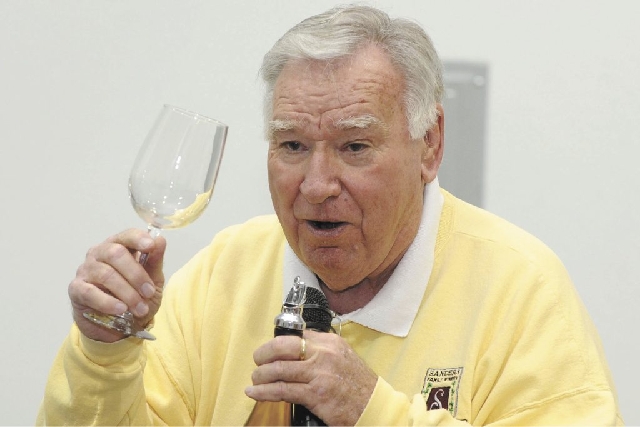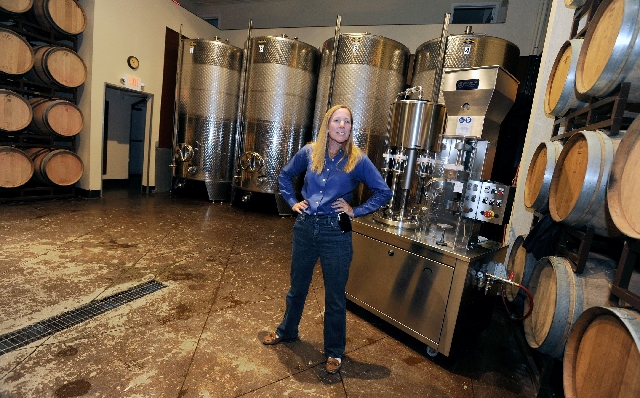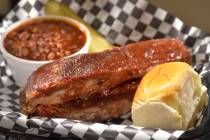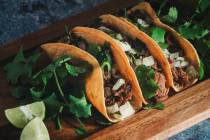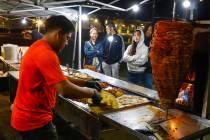Pahrump boasts ‘Nevada’s Wine Country’
“Come visit Pahrump, Nevada’s Wine Country.”
You laugh, but it could happen.
The little town wedged between the neon and flash of Sin City and the austere natural beauty of Death Valley may be known mainly as a bedroom community — and, well, the boudoir community — of Las Vegas, but Jack Sanders doesn’t see any irony in the recently adopted wine-related slogan or its place in Pahrump’s future.
That Sanders is both a winemaker and a member of the Pahrump Tourism & Convention Council might be part of the reason for that. But so is the fact that Pahrump now has two wineries (half, after all, of the state’s total), that there’s historic precedent for winemaking in Pahrump and that local wines have been raking in national awards.
Sanders is linked to both Pahrump wineries, as current owner of Sanders Family Winery and former owner of Pahrump Valley Winery, which for the past 10 years has been owned and operated by Bill and Gretchen Loken. That Sanders didn’t really intend to sell and the Lokens didn’t really intend to become winemakers is the kind of serendipity that seems to characterize life stories in this corner of the world.
A native of Marin County, Calif., Sanders originally came to Pahrump as a consultant to a company that was winding down operations in the area. He liked it — the friendliness, the openness — and he learned that around the turn of the 20th century, a man named Joseph Yount planted six varietals of wine grapes there. (Sanders says it doesn’t appear that Yount was related to George Calvert Yount, for whom the Napa Valley’s Yountville was named, but they clearly shared an affinity for wine grapes.)
Then, Sanders said, a man named Frank “Pop” Buol founded the state’s first commercial winery in Pahrump, producing Chateau Buol wines. Whether the company was ever commercially viable remains unclear, but Buol was bonded by the federal government, and Sanders says that according to oral history, he sold some of his wines to the Biltmore Hotel in Los Angeles. The winery, in whatever form, died out before Prohibition.
Cut to the ’80s, and Sanders’ determination to open Pahrump Valley Winery. That the climate, he said, is similar to that of California’s Central Valley, home to many of the country’s largest bulk wine producers, held promise.
The winery’s birth, however, was not without snags. The feds wanted to see some construction before they’d grant a license, and state law didn’t provide for Nevada-produced alcoholic beverages, specifying that anything sold in the state had to be imported. Sanders says the state attorney general at the time issued him an import license and advised him to drive the six miles to the California border and back so that he could “import” his wine into Nevada, which he did for about a year until the law was changed.
The winery officially opened in 1990, on what Sanders remembers as a “disastrous” day on which “we just did really stupid things,” such as opening all of their facilities, including a restaurant, at the same time.
They brought in French colombard and riesling grapes from Monterey County, Calif., for Sunset, a blend he calls “a social wine.” In the fall of 1990, the winery planted its own vineyards with symphony grapes. The fledgling vines survived their first winter. And then one day in late February or early March, Sanders and his cellar master, Ken Walker, were in the vineyard when they spotted what he refers to as “these critters.”
The critters were mustangs, shaggy in their winter coats. After an especially dry winter they’d come out of the mountains because they smelled the water that was irrigating Sanders’ grapevines. And, well, said grapevines, slender and fragile, wouldn’t be long for this world.
The wild horses belonged to the federal Bureau of Land Management. The BLM wasn’t liable for damages because the winery didn’t have a fence that they didn’t think they’d needed — but staff were told not to harass the horses. Clap your hands, they were advised, and you’ll scare the animals away.
Which, Sanders said, worked the first time. The second time, the horses fled about half as far. After a few repeats, Sanders said, “You could almost lean on the horse and it would look at you like, ‘Why are you looking at me?’”
Government workers came by about six weeks later to round up the animals, Sanders said.
“Out of that whole episode,” he said, “we lost our vineyards.”
But soon national news outlets were reporting, as Sanders remembers, “about the little upstart winery that was being decimated by these mustangs.
“It was devastating, but I couldn’t have planned it better.”
They replanted and kept importing grapes.
In 2004, amid rapidly escalating land prices, Sanders ended up selling to Loken’s brother’s company. Loken at the time had never set foot in a winery, but agreed to take it over and turn it around for resale. He and Gretchen started researching. And then the bug bit. But in 2005 they’d bought out the other parties and were the sole owners, and Gretchen had a winemakers’ certificate from the University of California, Davis.
In the 10 years they’ve had the winery, the Lokens have piled up more than 300 national awards — 46 in 2012 alone.
It seems you can make wine in Nevada.
Not a whole lot, truth be told. Pahrump Valley Winery, Loken said, produces about 75 percent of Nevada-grown wines; production was 500 cases in 2010, expanding to 1,500 in 2012 and a projected 2,000 this year.
The winery currently bottles four labels, Nevada Ridge, Charleston Peak, Pahrump Valley Winery and Loken — the reserve label; they plan to consolidate and eliminate the Nevada Ridge label.
To produce enough grapes for their total production, Loken said, he’d need close to 40 acres of vineyards; right now, they manage or own 10 to 12 acres.
“We will be bringing in California grapes as far as the eye can see,” he said.
Both Loken and Sanders see great promise for the Nevada wine industry, though to differing degrees. Sanders, who already presents plays and musicals in his courtyard (the next season starts April 26-27) and says about 20 weddings have been performed there, says he learned from the mistakes he made the first time, for example putting in larger restrooms for bus tours. His plans include an aging room lined in oak barrels for the production of port and cream sherry, picnic grounds and a bed-and-breakfast.
Loken (who is, incidentally, about to release the state’s first virgin olive oil, which will be available at the winery), acknowledges that he doesn’t want to greatly expand his vineyard holdings, but adds, “We want to continue to promote and expand Nevada wines. We’ve really seen the business come roaring back since late 2011.”
Regulation and water supply are the main threats, he said, but he adds that vineyards use 10 percent as much water as alfalfa, produce more per acre and attract tourism.
And, he predicts, the spotlight is about to shine on Nevada wines. Although the awards have been many, national attention hasn’t followed, but he thinks things like the feature CNN did last summer and the cumulative attention will pay off. The 2012 wines, Loken said, “are going to start putting Nevada on the map. Things will change this year.”
Contact reporter Heidi Knapp Rinella at hrinella@review journal.com or 702-383-0474.




